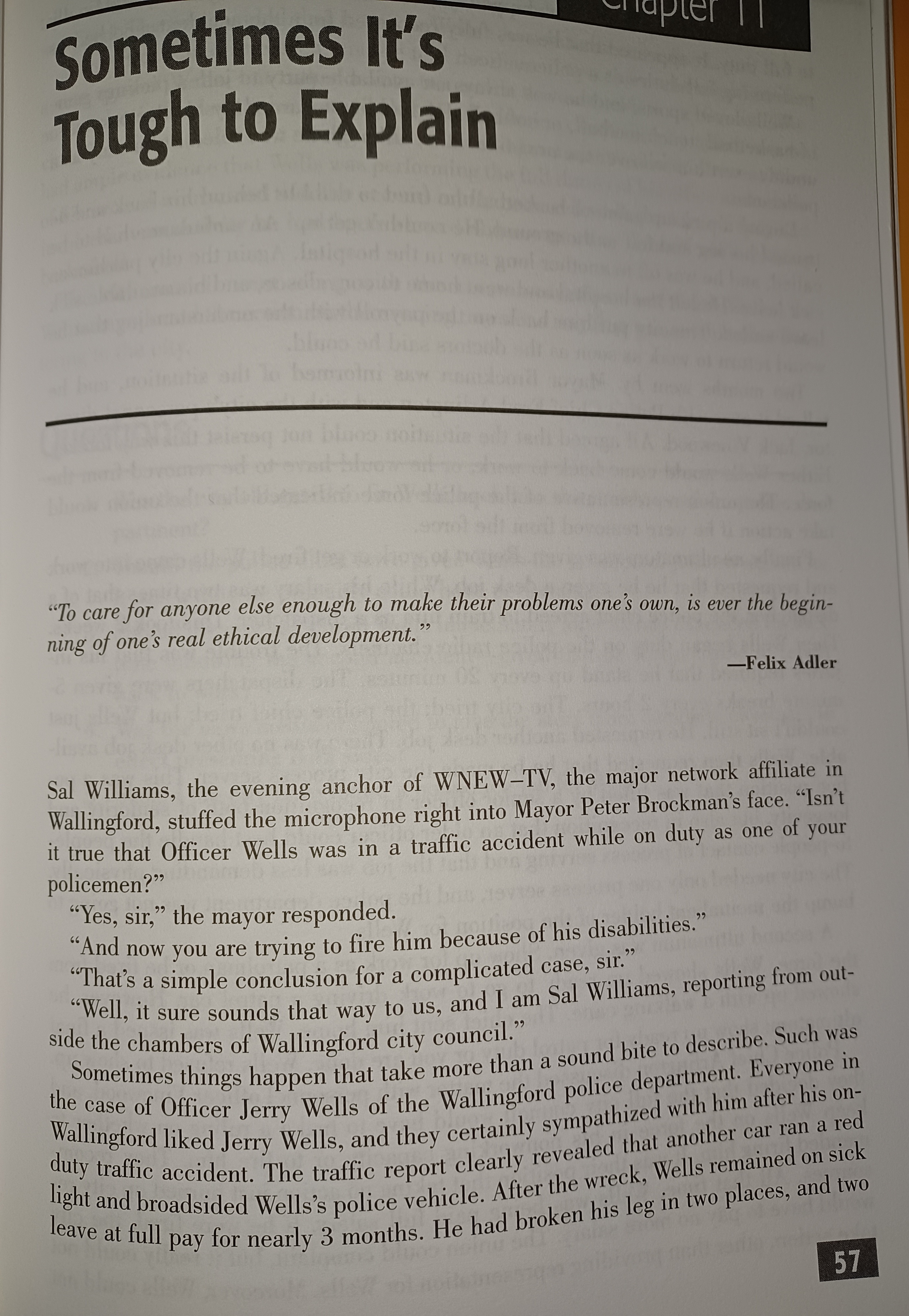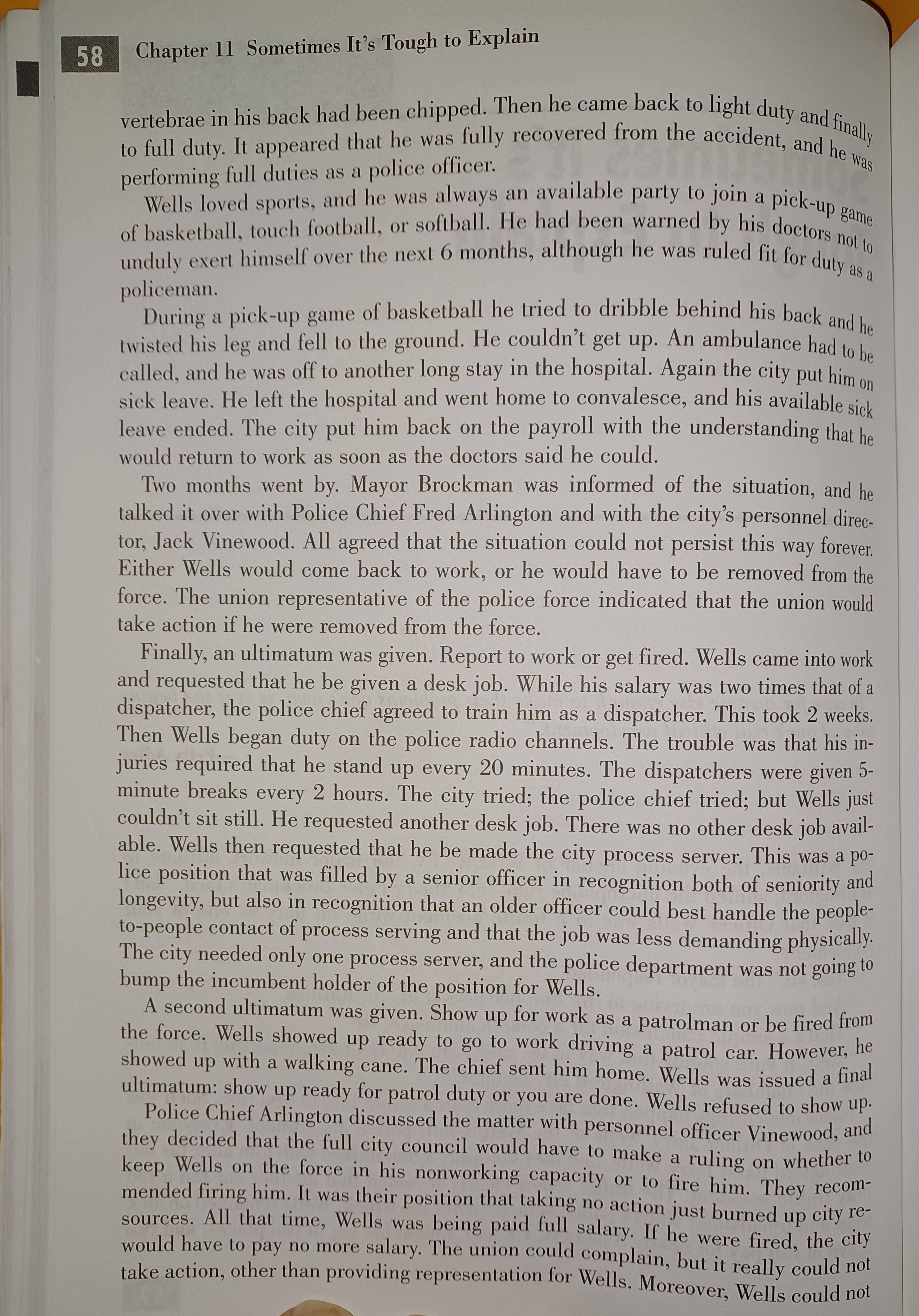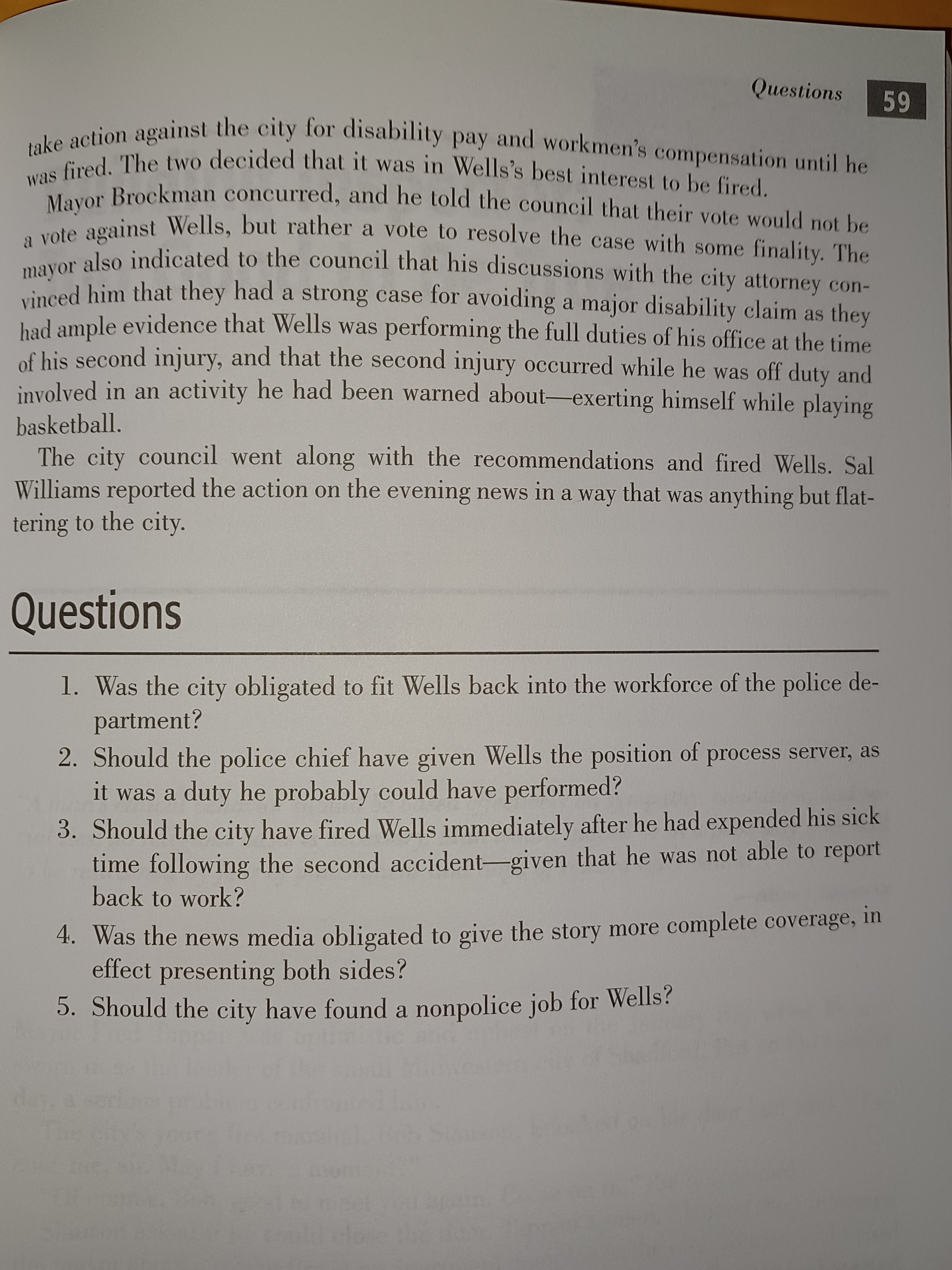Question: Answer the five questions. Sometimes It's Tapter 1 1 Tough to Explain bemoins To care for anyone else enough to make their problems one's own,
Answer the five questions.



Sometimes It's Tapter 1 1 Tough to Explain bemoins "To care for anyone else enough to make their problems one's own, is ever the begin- ning of one's real ethical development." -Felix Adler Sal Williams, the evening anchor of WNEW-TV, the major network affiliate in Wallingford, stuffed the microphone right into Mayor Peter Brockman's face. "Isn't it true that Officer Wells was in a traffic accident while on duty as one of your policemen?" "Yes, sir," the mayor responded. "And now you are trying to fire him because of his disabilities." "That's a simple conclusion for a complicated case, sir." "Well, it sure sounds that way to us, and I am Sal Williams, reporting from out- side the chambers of Wallingford city council." Sometimes things happen that take more than a sound bite to describe. Such was the case of Officer Jerry Wells of the Wallingford police department. Everyone in Wallingford liked Jerry Wells, and they certainly sympathized with him after his on- duty traffic accident. The traffic report clearly revealed that another car ran a red light and broadsided Wells's police vehicle. After the wreck, Wells remained on sick leave at full pay for nearly 3 months. He had broken his leg in two places, and two 5758 Chapter 11 Sometimes It's Tough to Explain vertebrae in his back had been chipped. Then he came back to light duty and finally to full duty. It appeared that he was fully recovered from the accident, and he was performing full duties as a police officer. Wells loved sports, and he was always an available party to join a pick-up game of basketball, touch football, or softball. He had been warned by his doctors not to unduly exert himself over the next 6 months, although he was ruled fit for duty as a policeman. During a pick-up game of basketball he tried to dribble behind his back and he twisted his leg and fell to the ground. He couldn't get up. An ambulance had to be called, and he was off to another long stay in the hospital. Again the city put him on sick leave. He left the hospital and went home to convalesce, and his available sick leave ended. The city put him back on the payroll with the understanding that he would return to work as soon as the doctors said he could. Two months went by. Mayor Brockman was informed of the situation, and he talked it over with Police Chief Fred Arlington and with the city's personnel direc- tor, Jack Vinewood. All agreed that the situation could not persist this way forever. Either Wells would come back to work, or he would have to be removed from the force. The union representative of the police force indicated that the union would take action if he were removed from the force. Finally, an ultimatum was given. Report to work or get fired. Wells came into work and requested that he be given a desk job. While his salary was two times that of a dispatcher, the police chief agreed to train him as a dispatcher. This took 2 weeks. Then Wells began duty on the police radio channels. The trouble was that his in- juries required that he stand up every 20 minutes. The dispatchers were given 5- minute breaks every 2 hours. The city tried; the police chief tried; but Wells just couldn't sit still. He requested another desk job. There was no other desk job avail- able. Wells then requested that he be made the city process server. This was a po- lice position that was filled by a senior officer in recognition both of seniority and longevity, but also in recognition that an older officer could best handle the people- to-people contact of process serving and that the job was less demanding physically. The city needed only one process server, and the police department was not going to bump the incumbent holder of the position for Wells. A second ultimatum was given. Show up for work as a patrolman or be fired from the force. Wells showed up ready to go to work driving a patrol car. However, he showed up with a walking cane. The chief sent him home. Wells was issued a final ultimatum: show up ready for patrol duty or you are done. Wells refused to show up. Police Chief Arlington discussed the matter with personnel officer Vinewood, and they decided that the full city council would have to make a ruling on whether to keep Wells on the force in his nonworking capacity or to fire him. They recom- mended firing him. It was their position that taking no action just burned up city re- sources. All that time, Wells was being paid full salary. If he were fired, the city would have to pay no more salary. The union could complain, but it really could not take action, other than providing representation for Wells. Moreover, Wells could notQuestions 59 take action against the city for disability pay and workmen's compensation until he was fired. The two decided that it was in Wells's best interest to be fired. Mayor Brockman concurred, and he told the council that their vote would not be a vote against Wells, but rather a vote to resolve the case with some finality. The mayor also indicated to the council that his discussions with the city attorney con- vinced him that they had a strong case for avoiding a major disability claim as they had ample evidence that Wells was performing the full duties of his office at the time of his second injury, and that the second injury occurred while he was off duty and involved in an activity he had been warned about-exerting himself while playing basketball. The city council went along with the recommendations and fired Wells. Sal Williams reported the action on the evening news in a way that was anything but flat- tering to the city. Questions 1. Was the city obligated to fit Wells back into the workforce of the police de- partment? 2. Should the police chief have given Wells the position of process server, as it was a duty he probably could have performed? 3. Should the city have fired Wells immediately after he had expended his sick time following the second accident-given that he was not able to report back to work? 4. Was the news media obligated to give the story more complete coverage, in effect presenting both sides? 5. Should the city have found a nonpolice job for Wells
Step by Step Solution
There are 3 Steps involved in it

Get step-by-step solutions from verified subject matter experts


